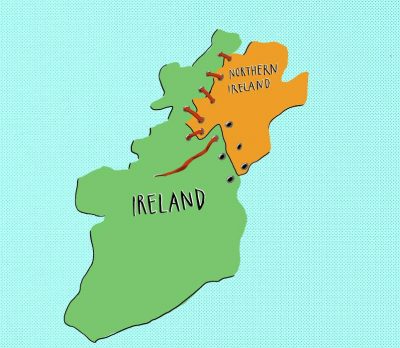St. Patrick’s Day is Wednesday, and I plan to celebrate with the purchase of a Shamrock Shake, or a mint milkshake, from McDonald’s.
This holiday occurs every year on March 17 to celebrate St. Patrick who, as the legend goes, got all of the snakes out of Ireland. Scientifically, there were no snakes in Ireland to begin with, and St. Patrick was most likely there to spread Christianity — more specifically Roman Catholicism — but the legend remains.
St. Patrick traveled to Ireland in the fifth century to establish Christianity on the islands. To this day, Catholicism is still the dominant religion in the Republic of Ireland.

The situation becomes more complex when you start to consider Northern Ireland and the religious and cultural makeup there. Catholics make up around 45% and Protestants makeup around 48% of the Christians living in Northern Ireland.
The political situation in Northern Ireland is enormously complex as well. Northern Ireland is known for its 30 years of bloody conflict against British rule across Europe from the ’60s to ’80s.
Northern Ireland is also known for its Irish Republican Army, which seeks to unify Ireland. They were in conflict with both Loyalist paramilitaries — those who wished to remain part of the United Kingdom — and the British Government until the Good Friday Agreement ended the violence and established the fragile peace that exists in Northern Ireland today.
This story has two main important parts in the agreement.
First, Northern Ireland remains part of the U.K. but has the option to leave if there were a vote and a majority consensus in favor. Second, the agreement allowed for open borders between Northern Ireland and the Republic of Ireland.
With the British Referendum to leave the European Union, certain Loyalist paramilitary groups are no longer honoring the Good Friday Agreement.
Brexit also means the borders between Northern Ireland and the Republic of Ireland — which is still in the European Union — will be closed. Northern Ireland itself voted to remain in the EU but it is forced to leave it with the U.K.
The vote to leave the EU was much more divided in Northern Ireland than in Scotland, which overwhelmingly voted to remain. Places such as Newry and Armagh — political arm of the IRA Sinn Féin has a lock — voted strongly to remain in the EU. In contrast, North Antrim — a district with the much more conservative Democratic Unionist Party — voted to leave.
The question remains: Should Northern Ireland unite with the Republic of Ireland, or should it remain part of the U.K. even though it voted to stay in the EU?

I am divided, and while my bias and political leanings lead me to support Féin, the peace of Northern Ireland is tenuous and there are strong arguments to be made as to why Northern Ireland should remain part of the U.K.
First, the arguments for a united Ireland. The U.K. has been exploiting Northern Ireland for as long as it has been part of the country.
During the potato famine of the 1840s and ’50s, a massive blight destroyed the Irish potato crop for seven years. While Ireland starved, England feasted on the potatoes they imported from the desperate country.
The U.K. continued to exploit Northern Ireland even after the Republic of Ireland became independent in 1918 — especially during the reign of former Prime Minister Margaret Thatcher, who paid loyalist paramilitaries to fight on behalf of the crown.
Now, Northern Ireland is being forced out of the EU, along with the rest of the U.K., for a decision it did not want.
Would Northern Ireland be better as a unified Ireland? Should Northern Ireland call for a referendum? Maybe, but it’s hard to say.
There are strong reasons why Northern Ireland should remain part of the U.K. as well. If the IRA succeeds in its ultimate goal, the loyalist paramilitaries may react with substantial violence. This violence would be much more difficult to resolve because, as Northern Ireland would no longer be part of the U.K., the fighting would most likely create a refugee crisis.
I say this because there are still a substantial number of people in Northern Ireland who want to remain part of the U.K. It is especially clear in the election results from 2019: Thirty percent of the vote went to the DUP — a party that strongly advocates for remaining in the U.K.
Northern Ireland leaving the EU would create many difficult problems.
So, when you are drinking your Shamrock Shake or decked out in green attire, consider the history of the holiday and consider the pros and cons of a unified Ireland.




